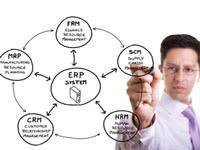ERP
Are Some ERP Consulting Firms Crooks?

Most in the ERP industry agree that software consultants can play an important role in helping their clients successfully implement a new ERP system. While some consulting firms have more expertise than others, at least most firms try to operate with their client’s best interest in mind.
However, there are many firms within the ERP industry that are outright thieves. They will not hesitate to take advantage of their clients in order to pad their own wallets. In fact, some firms are so good at this it has become part of their standard operating procedures. This is one reason huge consulting cost overruns are very common.
Clients that are educated and aware of the games consulting firms play can save themselves many headaches and a lot of money. Below are some of the tricks to watch out for.
1) The old “Bait and Switch” Routine
During the sales process, certain consultants are brought in to display the talent within the firm. These consultants understand the software, but it might be the last time you see anyone from the firm that does.
2) Resumes: Lies and Half-Truths
Falsification of consultant resumes is more common than you think. In addition, many resumes presented by the firm are not really resumes, but vague “profiles” that lack detail and read like sales literature.
3) Intentionally “Low-balling” the Quote
This is the oldest trick in the book, yet many clients continue to fall into this trap. For example, all consultants know that for time and material quotes the actual implementation costs are usually much higher. Also, most fixed price quotes are only fixed until further notice. When the client wants to make only minor changes in the project scope, they are hit with expensive change orders. The change order costs are usually 100 percent greater than the actual time for the consultants to perform the additional work.
4) The “Best” Implementation Methods and Tools
Most firms claim to have the best implementation methods and tools that the world has ever seen. However, do not be surprised when their consultants run off and do something entirely different during the project. Maybe the tools are not so great-otherwise their consultants would use them!
5) The Less You Know – The More Money They Make
For some firms, a client that has ill-defined project objectives, an undefined scope, or lacks basic knowledge of ERP; is considered a gold mine. The idea is to gloss over these “minor” details until after the client signs the contract.
6) Pushing Marquee Accounts for Reference Checks
When a potential client wants to perform reference checks, many firms only provide the names of their “marquee” accounts. These accounts are compensated by the firm in some form for being a reference. Therefore, do not expect these folks to deliver any bad news about the firm.
7) Not Enough Time and Talent?
Most consulting firms would love to camp out on your ERP project. One way to do this is to convince the client that the organization lacks the right skills and time for the project. That is, “No need to get your hands dirty. So sit back, relax, and enjoy the show… while we do the project for you!” Of course, this approach is usually a disaster waiting to happen.
8) Add-on Services
Once consultants get their foot in the door, many try to sell their clients additional services. These include more consultants for readiness assessments, change management programs, proverbial best practices, and other services you probably do not need. Also, don’t be surprised when your consultants push for software functionality that was originally out-of-scope.
9) The Promise of Software Knowledge Transfer
Most firms state that one of their goals is to work themselves off the project by transferring software knowledge to their client. However, nine times out of ten, if it is going to happen, the client must force the issue. Considering their hourly rates, what incentives do consultants have to transfer software knowledge?
10) Consultants are Driven to “Keep Busy”
Many firms measure the performance of their consultants based on utilization (billable hours). This culture can be so intense that when a consultant is not billing, he or she is not a good consultant even if there is no work to do. This is why some consultants find creative ways to keep billing on a project (one way or another).
Looking for additional ERP information? Check out our side-by-side comparison of the leading solutions in our Top 20 ERP Software report. You can also browse our exclusive Business-Software.com ERP resources by visiting the ERP research center.






